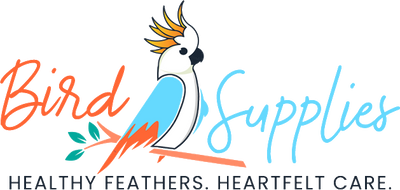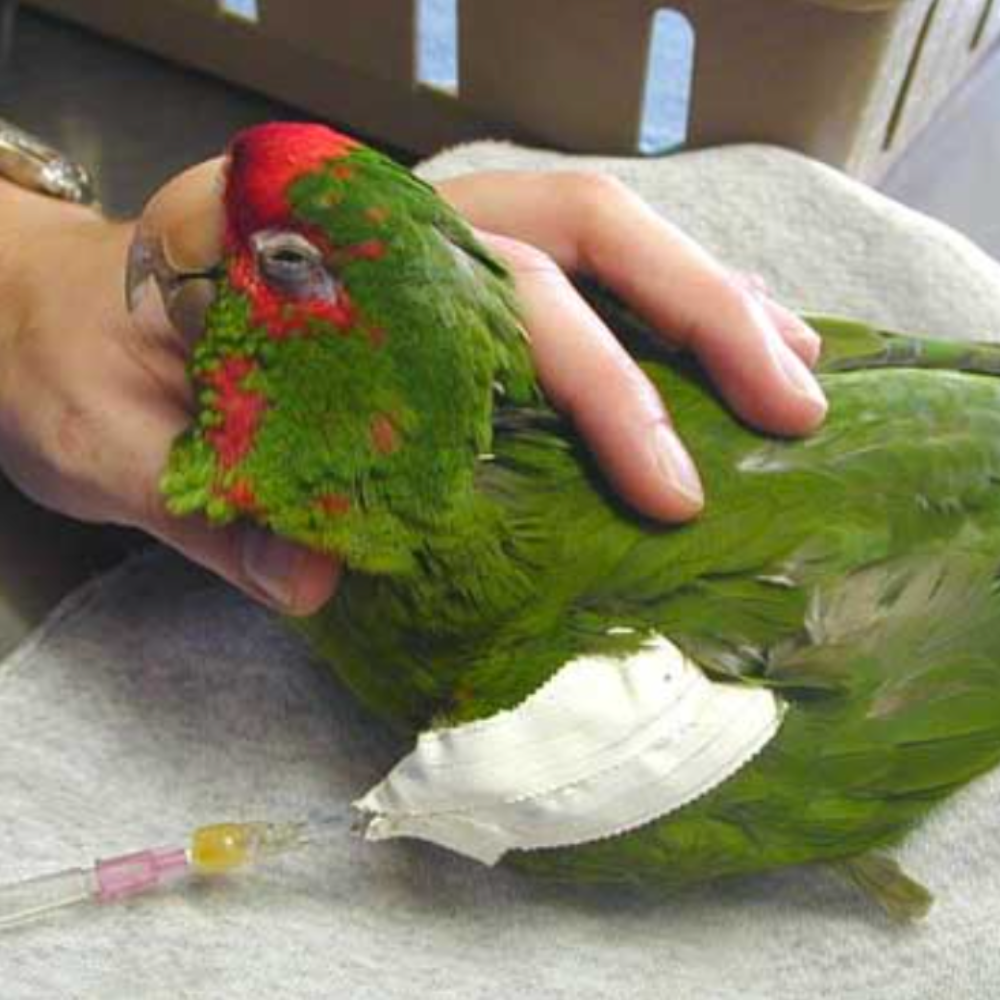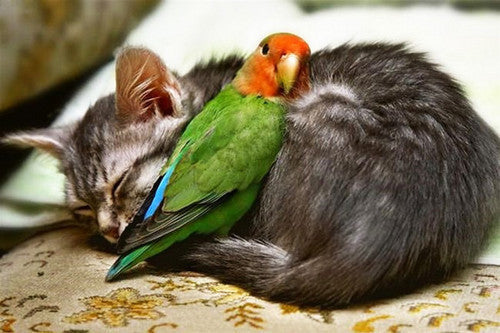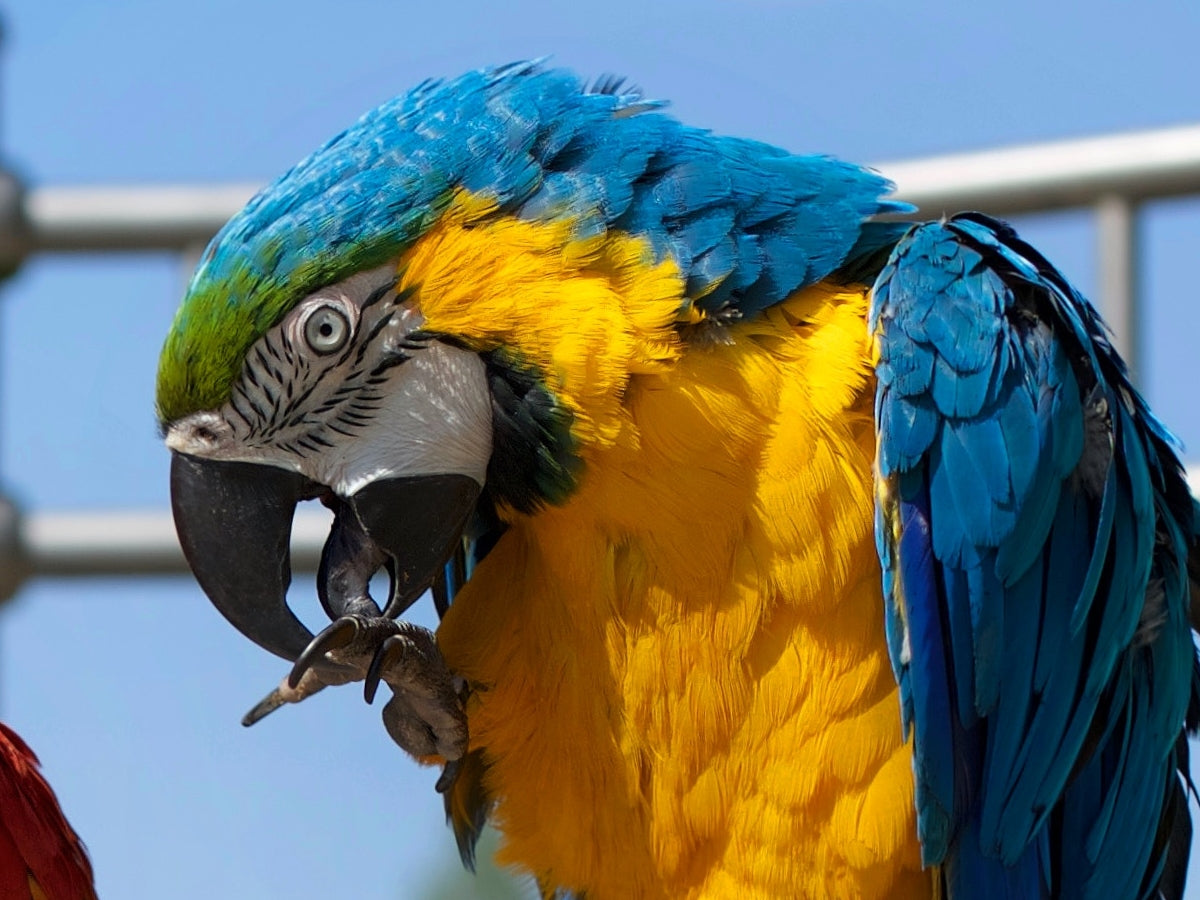Revised April 10, 2024
Table of Contents
- Why do you need a bird first aid kit?
- What Should you put in your bird first aid kit?
- What human related first aid items should I avoid?
- Are there bird first aid books that you recommend?
- What are the signs that my bird is having a medical emergency?
- What if I have no veterinarian nearby?
- Bird First Aid Kit Checklist
Hey bird lovers! Ready to dive into the world of bird first aid with me? As pet owners, we know how important it is to be prepared for anything. In this guide, I'll walk you through creating a bird first aid kit, spotting medical emergencies, and dealing with vets in remote areas. Whether you're a bird veteran or just starting out, let's make sure our feathered buddies stay happy and healthy together! 🐦✨
Disclaimer: Please note that the information provided regarding avian care or veterinary advice online is for informational purposes only and does not constitute a professional veterinary consultation. As I am not a licensed veterinarian and have not personally examined your bird, any suggestions or recommendations should be used at your own discretion and risk. It is strongly advised to seek consultation from a qualified avian veterinarian or utilize reputable online veterinary services for accurate and comprehensive assessment and treatment.
Why do you need a bird first aid kit?
Pet birds commonly experience accidents such as falls, collisions, and ingestion of toxic substances, posing serious risks to their well-being. Having a first aid kit readily available can empower bird owners to promptly address these incidents, providing essential care and potentially saving their feathered companions from harm.
Preventing bird accidents
According to EB Creavens (2005), some of the most common pet bird accidents include:
- Encounters with dogs, cats, and predators
- Flying away
- Being stepped on while walking on the floor
- Getting entangled in toys
- Being rolled over during sleep
- Drowning in water
- Colliding with windows and ceiling fans
Knowing these risks empowers you to enhance safety measures. So, what can you do to prevent such accidents? Remember, accidents may still occur, so being prepared is crucial.
Being prepared for mishaps
Birds can go into shock quicker than you might think! These little guys are quite sensitive, so when they're in accidents or feeling sick, they can go downhill fast. Recognizing the signs of shock and having a first aid kit and a hospital cage ready can really help your feathered friends. Stay prepared and keep our bird buddies safe and sound!
What should you put in your bird first aid kit?
Organizing your first aid kit
Consider opting for a brightly colored case that stands out, making it easy to spot in an emergency. Keep it in a designated area for quick access and remember to give it a once-over annually to ensure everything's in order. This simple routine ensures your supplies are readily available and in top shape when you need them most. Below, I'll discuss what types of items need to be in the kit.
Items to stop bleeding
Why:
Quickly stopping bleeding in birds is crucial due to their higher metabolic rate and smaller blood volumes compared to mammals, rendering them more vulnerable to blood loss.
What helps clot blood
- Styptic powder
- Baking flour
- Corn starch
- Gentle pressure with sterile gauze
How to help your bird
-
Assess the Injury: Carefully examine your bird's wound to determine the severity and location of the bleeding.
-
Apply direct pressure: Gently place a clean cloth or gauze over the wound and apply firm pressure to stem the bleeding.
-
Use cornstarch or flour: Apply fresh cornstarch or flour to the wound to aid in clotting and promote faster healing.
-
Place your bird in a hospital cage: Transfer your bird to a quiet, enclosed hospital cage to reduce stress and allow for observation of the wound to see if bleeding has stopped.
- Call your vet: If the bleeding is severe or doesn't stop within a few minutes, seek immediate veterinary care for further evaluation and treatment.
Items to assess the injury
When examining and assessing your bird's injury, take gentle yet effective steps to ensure their comfort and safety.
- Put on Nitrate gloves if necessary. Gather a pen light and a towel to restrain your bird.
- Begin by gently toweling your bird using a soft washcloth for small birds and a towel for larger ones, providing a secure yet gentle restraint.
- Use a penlight to visually inspect the injury for punctures, cuts, broken bones, or other abnormalities, ensuring a thorough assessment.
- If your phone has a magnifying app, take a photo of the injury.
Disinfecting & wound cleaning items
-
Gather Supplies: Start by collecting necessary supplies for bird wound care.
- Sterile scissors & tweezers
- Cotton balls
- Gauze
- Syringe without needle to flush wound
- Antiseptic
- Sterile saline
-
Choose Bird-Safe Antiseptics: Consider gentle yet effective antiseptics suitable for birds, such as:
- Iodine: Dilute with water to create a weak tea-like solution.
- Hydrogen Peroxide: Use in its mild form, avoiding creams or ointments to prevent excessive feather loss.
- Manuka Honey: Known for its antibacterial properties, ideal for treating wounds and burns.
- Vetericyn Wound Spray: Contains hypochlorous technology, suitable for cleaning bird wounds effectively.
- Avoid Harmful Substances: Refrain from using salves, petroleum jelly, or oily substances on birds without consulting a veterinarian.
- Document and Inform: Take another photo of the wound after initial treatment and inform your veterinarian or vet tech for further guidance and assessment.
Items for injured wings or feet
Because of their small and occasionally hollow bones, it's not uncommon for birds to experience fractures from trauma, such as falling from a perch, sustaining injuries from other animals, or accidental stepping by their owner. Seeking veterinary care is crucial to alleviate pain and ensure proper setting of the fracture for optimal healing.
Stabilize your bird in a hospital cage
Having a clean bird hospital cage readily available is essential for emergency situations or unexpected illnesses. It provides a safe and controlled environment for your bird to recover or await veterinary care.
Consider investing in a convenient bird carrier like the Perch and Go by Featherland. It offers both comfort and security during transport to the veterinarian or in case of evacuation for small and medium sized birds.
-
Stay Calm: Approach the situation calmly to avoid further stress for your bird.
-
Remove Perches: If your bird is unable to perch comfortably, consider removing perches from the cage to prevent additional strain.
-
Cushion Cage Bottom: Line the bottom of the cage with soft padding or towels to provide a comfortable surface for your bird.
-
Take Your Bird to a Stress-Free Area: Place the cage in a quiet, stress-free environment to minimize agitation.
- Ensure food and water are easily accessible by placing them in shallow dishes within reach of your bird. Consider adding Pedialyte or electrolytes to the water to help prevent shock and maintain hydration levels.
-
Keep Your Bird Warm: Ensure the environment is warm, as birds may become more sensitive to temperature changes when injured.
-
Lower The Light: Dim the lights in the room to create a calm atmosphere and reduce stimulation.
- Call Your Vet: Contact your veterinarian immediately for further guidance and to schedule an examination.
What human related first aid items should I avoid?
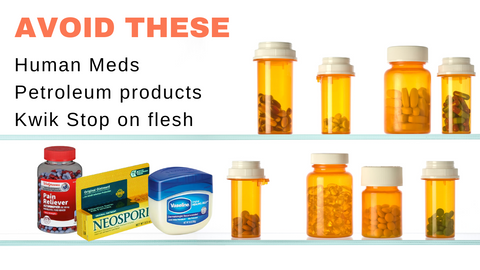
It's crucial to avoid administering any human medications to your bird unless specifically instructed by a veterinarian. Many medications safe for humans can be harmful or even fatal to birds, including painkillers, cold medicines, anti-cancer drugs, antidepressants, vitamins, and diet pills, as cautioned by the ASPCA.
When it comes to treating bird injuries, it's important to refrain from using Quik-Stop or similar products on any part of the body except for foot injuries. Instead, opt for safer alternatives like cornstarch or flour to help stop bleeding effectively.
Additionally, it's imperative to steer clear of petroleum-based products when caring for your bird. These substances can be toxic if ingested or absorbed through the skin, posing serious health risks to your feathered companion.
Are there bird first aid books that you recommend?
Book 1: "First Aid for Birds" by Tim Hawcroft, January 1994, Howell Books.
This comprehensive guide focuses on administering first aid to birds, providing step-by-step information on emergency situations that bird owners may encounter. Written by an expert, it offers valuable insights on how to quickly save your bird's life by taking action and prevent emergencies through proper care and bird-proofing your home. Filled with color photos, informative sidebars, and fun facts, this book makes caring for your pet bird easy and enjoyable.
Book 2: "First Aid for Birds: An Owner's Guide to a Happy Healthy Pet" by Julie Ann Rach, January 1999, Howell Book House.
This book offers essential guidance on providing first aid to birds, ensuring they lead happy and healthy lives. It provides detailed instructions on assessing symptoms, evaluating first aid priorities, and administering care in emergency situations. With practical tips on accident prevention and expert advice on bird health, this book is an invaluable resource for bird owners
What are the signs that my bird is having a medical emergency?
- Difficulty breathing
- Discharge from the eyes, nose, or beak
- Loss of balance or coordination
- Unusual droppings or changes in feces
- Loss of appetite or refusal to eat
- Visible wounds or injuries
- Excessive feather plucking or disheveled appearance
- Lethargy or weakness
- Seizures or tremors
- Abnormal behaviors or vocalizations
What if I don't have an avian or exotics vet nearby?
1. Remain calm and assess the situation if your bird is experiencing an emergency without access to an avian or exotics vet.
2. Create a safe, warm, and quiet environment for your bird, potentially using a hospital cage as discussed in the "Stabilize Your Bird in a Hospital Cage" section.
3. Reach out to local veterinary clinics or animal hospitals for emergency bird care.
4. Consider consulting online avian veterinary services for immediate guidance and support.
5. Watch educational resources like the YouTube video by Stephanie Lamb described above for additional assistance.
Include these supplies in your kit:
- ☐ Antiseptic Skin Cleanser
- ☐ Sterile Cornstarch
- ☐ Wash Cloth or Towel
- ☐ Sterile Saline Solution
- ☐ Styptic Powder
- ☐ A Pair Forceps
- ☐ Sterile Gloves
- ☐ A Pair Blunt (Grooming) Scissors
- ☐ Roll of Paper tape
- ☐ Pedialyte or Avian Electrolytes
- ☐ A Penlight
- ☐ Vet Wrap
- ☐ Sterile syringes (10 mL & 20mL)
- ☐ Sealed Alcohol wipes
- ☐ Tongue Depressors
- ☐ Cotton Tipped Swabs
- ☐ Gauze Pads
In conclusion, having a well-equipped bird first aid kit and knowing how to respond to emergencies are essential for every bird owner. Take action today to prepare yourself and your bird for any unexpected situation. By being prepared and knowledgeable, you can provide timely care and potentially save your feathered friend's life. Remember to stay calm, assess the situation, and seek veterinary assistance when needed. With these resources and skills at your disposal, you can ensure the health and well-being of your beloved bird companion.
Let others know what you learned on Facebook and Instagram! Use 🌟 #BirdFirstAid
Related Posts:
How To Make A Bird Hospital Cage For An Injured or Sick Bird
How To Help A Bird With Respiratory Problems
How To Tell If Your Bird Has Been Poisoned
References:
Creavens, E. B. (2005). Frequently occurring pet bird accidents and how to evade one. World Parrot Trust. Retrieved from https://issuu.com/worldparrottrust/docs/frequently-occurring-pet-bird-accidents
Lightfoot, T. L. (2020, January). Injuries and Accidents of Pet Birds. In M. Merck & Co. (Ed.), Merck Veterinary Manual. Retrieved from https://www.merckvetmanual.com/bird-owners/disorders-and-diseases-of-birds/injuries-and-accidents-of-pet-birds
Pet Assure. (2018, May 24). Top 10 Dangers to Pet Birds. Pet Assure. https://www.petassure.com/new-newsletters/top-10-dangers-to-pet-birds/
Lafeber Pet Birds. (2021). Avian Emergency: First Aid for your Pet Bird Part 1 [Video]. YouTube. https://youtu.be/--834Ezyx8I?si=KyU3a9zZMQiZNiUy
Link to this blog
https://birdsupplies.com/blogs/news/157076551-how-to-prepare-a-bird-first-aid-kit
Diane Burroughs, LCSW is a licensed psychotherapist trained in ABA therapy techniques. She specializes in avian anxiety disorders and is certified in Nutrition For Mental Health. Diane has written a number of bird behavior books and she offers behavior consultations. She's developed a range of UnRuffledRx Science-backed Parrot Wellness Supplies.
Diane's products have been featured in the Journal of Avian Medicine and Surgery and at Exoticscon, a conference for exotic pet veterinarians. Her bird collars & supplements are stocked in avian vet clinics and bird stores throughout the US. With over 30 years in the field of behavior, Diane has created thousands of successful individualized behavior plans that help pets thrive.
TAGS: #BirdFirstAidKit #ParrotFirstAidKit
SHARING IS CARING! PLEASE SHARE ON YOUR FAVORITE SOCIAL MEDIA NOW!
